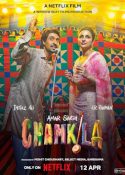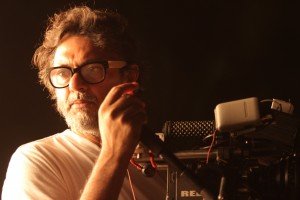 Award-winning filmmaker Rakeysh Omprakash Mehra brings to the silver screen, this Friday, Bhaag Milkha Bhaag, the true story of the “Flying Sikh”: world champion runner and Olympian Milkha Singh. Starring Farhan Akhtar, who amazingly has transformed himself into the runner for the film, BMB also features Sonam Kapoor, Divya Dutta and Art Malik. The film is the celebration of the man behind the runner, and Bhaag Milkha Bhaag will see Milkha fly, fall and rise, and bruise his soul but not his will to survive!
Award-winning filmmaker Rakeysh Omprakash Mehra brings to the silver screen, this Friday, Bhaag Milkha Bhaag, the true story of the “Flying Sikh”: world champion runner and Olympian Milkha Singh. Starring Farhan Akhtar, who amazingly has transformed himself into the runner for the film, BMB also features Sonam Kapoor, Divya Dutta and Art Malik. The film is the celebration of the man behind the runner, and Bhaag Milkha Bhaag will see Milkha fly, fall and rise, and bruise his soul but not his will to survive!
Sometimes we interviewers are very lucky and an interview becomes a conversation, which is fabulous. Then there are the amazing interviews where you are even luckier because you are completely inspired by the conversation, you get so much more that you ever thought and cannot wait to present the interview to the world. My interview with director Rakeysh Omprakash Mehra was one of those interviews, and it has to be one of the most fascinating, educational, and inspiring talks I have ever had. I learned so much, was moved, laughed, got chills and I got an incredible look inside the story of Milkha Singh and Bhaag Milkha Bhaag. Sit back and enjoy the experience as Mr. Mehra tells us the amazing tale of Milkha Singh and the making of Bhaag Milkha Bhaag.
What made you decide to tell this story on film?
The beginning
It is hard to say. I am from North India from Delhi; I have grown up with the folklore of Milkha Singh. As kids, this was the name, which always was referred to us, on many occasions, not just for sports, but the idea of taking our lives and how to be with and in life. I guess somewhere deep down it must have resonated, must have made a place in my heart and in my subconscious. I was a sports fan, of sorts. I used to swim a lot. I swam for Junior India. We actually spent a lot of time in the National stadium in Delhi and 30 years before me Milkha Singh used to practice there. We were always given examples of his dedication, his hard work, how he would come in to the stadium and at times he used to spit out blood, urinate blood, he used to go unconscious after his race and they would have to give him oxygen. Somewhere the seed was planted. There never really was a decision to make a movie. Then five years ago, I happened to read a little more about him. I found an autobiography of Milkha, which was like a Xerox copy; I don’t even know if the pages were complete. It was kind of out of print. I read the first few pages and it was quite exciting and then it was very moving when I understood about his childhood. I called a common friend of mine, he is in sports management in Delhi and I said, ‘Can I get a meeting to Milkha Singh’? And he said, ‘For sure’ and he called him up. He spoke to Milkha’s son Jeev Milkha and a meeting was arranged. I flew to Chandigarh to see him. I got a very warm welcome and I spoke to him for a couple of hours. On the flight back from Chandigarh I made up my mind that I really want to tell this story. And I wanted not to tell the story of the athlete but the man behind the athlete, the person, the idea of Milkha Singh. The triumph of the human spirit, howsoever cliché it might sound…
What he told me in those two hours changed my life, I think, forever.
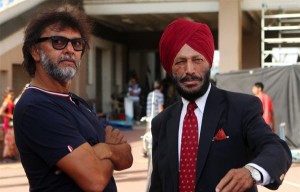 Childhood
Childhood
He shared his childhood with me. Not many of us know that he is a victim of partition. 1947, the British left India, and the nation was celebrating Independence, but millions had also suffered in the partition of the country. They were rendered homeless – they were refugees. Milkha Singh was one of them; he came from a small village that was on the now Pakistan side. This 12-years-old kid witnessed a massacre of his father, of his mother and his three sisters and his four brothers, his cousins. Right in front of his eyes. It was a massacre of 2000 people conducted by the army. He then hopped a train and eventually he made his way to Delhi. In Delhi he lived on the streets, on railway platforms, he stayed in a refugee camp in the Old Fort. When I was researching the refugee camp most of my research came from the British Council Library in Paddington in London because they have really preserved that era of Indian History. The nation was just forming, we wrote the constitution in 1956 – I am talking 10 years before that. The images I saw of the partition, and the Movietone, you know those British pictures, the newsreels? The Movietone that I saw – I just couldn’t sleep after that. It moved me so much! One of the majors in the British army, a lady, she was a doctor in the medical corps, she described that when she entered the refugee camp in the Old Fort, which is where Milkha also found shelter, she said, “The first thing that struck me was that there were no leaves on the trees… people had eaten the leaves’. You know at 12, Milkha joined a gang of sorts… for survival. They used to steal from boxcars, they used to steal grain, rice, sugar, and they used to steal coal from moving steam locomotives. So these were not thefts, they were acts of survival. Nothing else.
So what does it take for a boy who is homeless, who is completely displaced, homeless is an understatement; doesn’t have parents, doesn’t have a roof on his head, doesn’t have shoes to wear, doesn’t have food to eat… to become a world champion. To become the first international icon outside politics from India. And to go out in the Western world and get into a discipline and excel in it, excel like how! And beat the western world in their own backyard! Athletics is not an Indian sport, we have always been known for hockey and cricket. Running is an individual sport – it is a lonely place. It is like once the race starts, you have to finish it there is no time to think. (Laughs)
The Army
His Dad used to say to him, ‘What are you going to become when you grow up’? He answered, ‘I am going to join the Army’. That remained somewhere in him and he grew up and he tried for the Army, while he was still a thief he kept trying, and on his fourth attempt he got into the Indian Army. This was an army jawani, jawan is a support in the army, some of them are the cooks and support staff. Finally you got a rifle in your hand in the shooting range but you are not a soldier soldier, you become a soldier after a couple of years. Then the Army kind of discovered the athlete in him and nurtured him. The Indian army has given soldiers, but it also has given some wonderful sportsmen to the nation. Around that time the only organized stuff was the army. The rest, India was just forming, the law and order, the education, the social infrastructure; the sporting infrastructure was completely non-existent. They nurtured him and everything else is history!
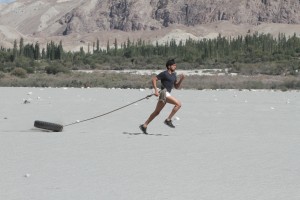 Milkhajis’ running career
Milkhajis’ running career
He created the National record, which didn’t get broken for half a century. So Stacey you have to believe, a half a century is 50 years right, and your record stands in your country… so you ran 50 years in advance or what? (Laughs) I thought what is going on?
You have to understand his achievement. He went to Melbourne Olympics first. He was so innocent on the flight he made chaos. He said the plane has caught fire because he saw the fuel burning from the propeller and he shouted and said, ‘Let’s jump out, jump out!’ (Laughs) Everybody said ‘Hey take it easy, what is going on?’ He said, ‘No, the plane is on fire!’ The captain came and said ‘What’s wrong, just calm down!’ He said, ‘No look out of the window, the plane is on fire’! The captain said, ‘No the plane flies like this, you know the rockets, the firecrackers, how you burn them? How they go up in the air, that is how planes fly’. He said, ‘Oh cool, but who are you?‘ ‘I am the Captain’. Milkhaji said, ‘What Captain? What being captain?’ He said, ‘I am the captain. I am the pilot. I fly the plane’. Milkhaji said, ‘Then why did you leave and come?’ (Laughs) So innocent! And if someone would ask him, ‘So are you relaxing?’ He would say, ‘No, I’m Milkha Singh. 400 meters’.
He goes out and in Melbourne he loses. He punishes himself, he looks in the mirror and he finds a loser in the mirror and he slaps himself black and blue. He slaps himself over and over and he bleeds from his lips. He cannot forgive himself. He goes to his coach on the flight back and he says, ‘Sir, what is the world record for 400 meters? Please write it on this paper.’ The coach wrote it and Milkha took that paper and for the next two years he used to pray to the paper. You know where the photograph of the deity usually is, he put that paper and he used to light a lamp in front of that paper.
He fully jumped into the fire and he worked so hard that we he came out in 1958 the boy had become a man. He was totally transformed. He went to the Asian Games, he won the double 200 meters and 400 in record time – broke the Asian record. One month later in ‘58 he went to Cardiff in England to the Commonwealth Games. The Commonwealth was a huge movement at that point in time. They were huge games, the whole world used to participate like whether it was Australia, Canada, South Africa, Jamaicans, they were all there – great runners and world record holders. He beat them and he created the Commonwealth Game record for the 400. Nobody knew this guy with such long hair tied on his head -where did he come from? What happened?
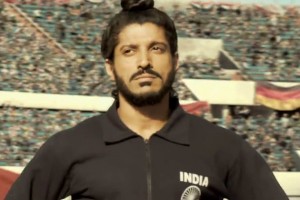 Milkhaji ran 80 races on the world circuit. All over Europe, Russia, Japan, all over and he won 77 Golds out of the 80.
Milkhaji ran 80 races on the world circuit. All over Europe, Russia, Japan, all over and he won 77 Golds out of the 80.
Then came the time in ‘60 he fulfilled his promise to his coach and he broke the world record in France. This was one month before the Rome Olympics in 1960. When he went for those Olympics he was a favorite to win. The Italians just loved him; they used to chant ‘Singh, Singh’ whenever he used to enter the stadium. If you read the 1960 Olympic book, you will find his race as one of the most glorious races ever ran. He ran the race, he led from the front at 250 meters he thought he was running to fast, so he looked back to see how far he is and that mistake cost him the gold medal and he lost the race. He broke the world record once again; in fact all four of them broke the world record. He set such a tremendous pace to the race in the beginning that nobody had a choice but to break the world record. That is why it is known as the most historic race because all four broke the world record. It has never happened in the history of the Olympics that everyone breaks the world record. But that looking back, that mistake cost him the Gold. He has never forgiven himself. Never will forgive himself. He was heartbroken. He became a villain overnight in the country. It became a black day for Indian sports. You know, how you praise someone and then they pull him down? That happens all the time. For me though, it was like someone who lost the most important race of his life, someone who lost on the most important moment in his life, not just the race, but he wins in life. That was the interpretation.
The race in Pakistan
The then Prime Minster Jawaharlal Nehru used to treat him like a son, he could walk into his house any time. Jawaharlal Nehru was the first Prime Minister of India and he was the architect of modern India. Nehru was very concerned about the ongoing war with Pakistan. He thought about this conflict, about the first sporting meet after Independence, and the ethnic violence, and the war we fought with Pakistan in ‘48 and the proxy wars all the time between the nations. He and the president of Pakistan, General Ayub Khan, they said, ‘Let’s do a sports meet and let’s bring peace through sports’.
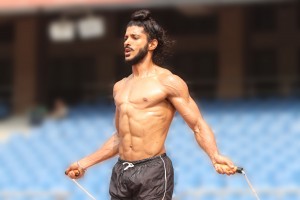 So the Prime Minister said, Okay and Milkha Singh is going to lead the contingent from India. Milkha Singh – he refused. He refused to go. He refused the Prime Minster; it was all over the papers. Milkha said, ‘I’m not going to go’. The PM said, ‘I want to meet him. Why is he refusing’? He went to the Prime Minister and he said, ‘Sir, there is blood in the air out there of my own. I won’t be able to breathe and you are asking me to run’. The Prime Minster said, ‘Son, that is exactly why you need to go. You don’t want any more kid Milkha Singh’s happening. You are a soldier and your job is to fight wars and this is a war you have to fight with yourself. A war within. You must’! So he went to Pakistan. He ran the race of his life there. He was ahead by 20 meters in a 200 meter race! It is said, that nobody had ever seen him run like that before. It was a cathartic moment for him. Field Marshall Ayub Khan, the President of Pakistan, said, ‘Son, I have never seen anybody run like that. You did not run today, you flew. And the world from today will know you as the Flying Sikh.’ So he got that title from the land where he was born. Ayub Khan said, ‘Pakistan is proud to give you this title’. And today India and the world knows him as the Flying Sikh. Little did we know that he got the title from Pakistan. So all that hatred he had inside, in that one moment, melted into love! He realised it is not the people; it is the circumstances which makes us do things the way we do.
So the Prime Minister said, Okay and Milkha Singh is going to lead the contingent from India. Milkha Singh – he refused. He refused to go. He refused the Prime Minster; it was all over the papers. Milkha said, ‘I’m not going to go’. The PM said, ‘I want to meet him. Why is he refusing’? He went to the Prime Minister and he said, ‘Sir, there is blood in the air out there of my own. I won’t be able to breathe and you are asking me to run’. The Prime Minster said, ‘Son, that is exactly why you need to go. You don’t want any more kid Milkha Singh’s happening. You are a soldier and your job is to fight wars and this is a war you have to fight with yourself. A war within. You must’! So he went to Pakistan. He ran the race of his life there. He was ahead by 20 meters in a 200 meter race! It is said, that nobody had ever seen him run like that before. It was a cathartic moment for him. Field Marshall Ayub Khan, the President of Pakistan, said, ‘Son, I have never seen anybody run like that. You did not run today, you flew. And the world from today will know you as the Flying Sikh.’ So he got that title from the land where he was born. Ayub Khan said, ‘Pakistan is proud to give you this title’. And today India and the world knows him as the Flying Sikh. Little did we know that he got the title from Pakistan. So all that hatred he had inside, in that one moment, melted into love! He realised it is not the people; it is the circumstances which makes us do things the way we do.
You know Stacey, if you get mugged in a dark alley or in a Subway, you will stop taking the route home. You won’t go into that alley. Here he was going back into the land where that horror happened and he had kept that somewhere in the dark corners of his subconscious and locked it away and thrown the key away and never wanted to revisit those memories. And they came back rushing to him. So somewhere it is like you just can’t run away from your fears, you have to run along with them. That is how I have interpreted his running, that’s how I see it.
I imagine winning that race would be even better than winning a Gold medal.
Yeah, there is no question about it. It is about winning in life!
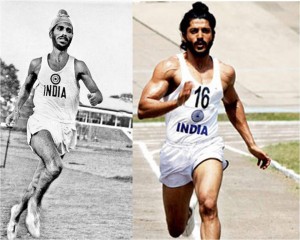 Farhan Akhtar
Farhan Akhtar
What went into your decision to have Farhan Akhtar take on this role?
I didn’t think about it. It is more I go with instincts. You know, you have this small voice within yourself, which kind of gets drowned with all the noise and chaos around you, so in anything I do, the stories I pick up, the people I work with I always try and be in touch with myself and I heard that little voice. That instinct, I think, took me to Farhan. You know, I didn’t even narrate the story. Just how I spoke to you… I spoke to him and 20 minutes later he was doing the film. I didn’t hand him a script. I didn’t say this is page one, this is page 120 and the film opens with blah, blah, blah and the camera goes here. I just poured my heart out to him and I said this is it. ‘I am dying to tell this story, will you be my co-conspirator?’ And he agreed.
He came and he gave everything. He understood the purpose. He completely fell into the purpose. And look what he has done. Look what he is looking like. He has not played the part – he became the part. He has made all of us look so good. It is so wonderful.
It is amazing. I mean if I hadn’t know that it was him starring in the film when I first saw the trailer, I would have never known that was him because he has gotten so lost.
That is such a good compliment, Stacey. You can’t give a better compliment to an actor. That he is looking the character and that he is not looking as the actor. That’s what makes it so unBollywood. This is not a Bollywood flick; it is more a world flick.
So how did you work with him to get him so into that character and into the transformation?
It is a process, there is a process, you do things, there is a physical transformation, there is an emotional investment, there are rehearsals, there are readings, there are improvisations. Then, the language of cinema is so world style, so dynamic, it is so beautiful, it is so larger than life, it is so like a dream that you can have so much fun!
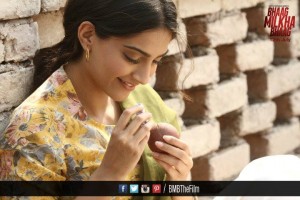 Then there is Sonam Kapoor as Biroo, Milkha’s love interest…
Then there is Sonam Kapoor as Biroo, Milkha’s love interest…
Once the script was there and we were thinking where to go, what to do and whom to cast. We were looking all over the world for the characters and out auditioning. Sonam was my first choice; she was so much the character the way she was described in the script. Then I took it to her, she loved the story so much. She said she will do it only on one condition and her condition was that she would not get paid for it. She will not charge a single penny. And she didn’t, she just took 11 rupees. 11 is a very auspicious thing in India, so I gave her 11 rupees. You know the purpose became larger than all of us. I am so fond of Sonam. She is really coming into her own. She is discovering herself as an actress. Every actor, every actress, every filmmaker, every musician, every director, every writer, we all have a journey and I am so proud of her.
I believe I read that you had real runners in some of the scenes…
In all the scenes. You are recreating Tokyo Asian Games, Rome Olympics, Melbourne Olympics, the European circuit, the Indian Nationals, so we had to have them. The Indian Olympic Association helped us, the sports authority of India, then we got runners from the Athletics of Australia, the International Olympic committee helped us get runners from England and the US, even from Japan. See it has to feel right. You are recreating a time, an era, and they are athletes. I mean you can’t pretend to run! (Laughs) It is not like jogging in the part in the morning. You know, how you can’t pretend to play the violin, you play it and you hear it. You can’t pretend to dance because you have to dance. You have to dance like a ballet dancer. You can’t fake a ballet. (Laughs) You really can’t fake running and to run like that and to run like world-beaters as world champions and to have that body type, the technique. Your lead actor can go into training and Farhan did that, but you can’t start training fifty people for the roles. So using the real runners was the easiest thing actually. They were there, and they consented or they all came to India. They didn’t charge, any one of them. They just came here for a lark. We flew them in, they were like guests. They enjoyed it; they were doing what they loved doing.
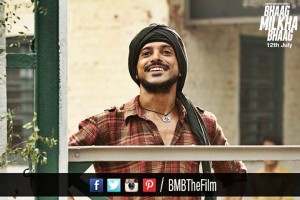 As you know I really loved the music of the film. Can you tell me about creating the sound and the music for BMB?
As you know I really loved the music of the film. Can you tell me about creating the sound and the music for BMB?
That was simple. SEL and I go back a long way. When I made my first audiovisual, ever, Loy was my music director. When I directed my first ad film for Hero cycles, that was donkey years back, Ehsaan was my music director. When Shankar composed for the first time for an ad film and he discovered the music director in him – it was for me. There was always this thing of ‘Hey, when are we going to work together?”
Then, three years ago almost when I started writing and Prasoon [Joshi] has written the script. Prasoon is really dear and we worked on Rang De Basanati and Delhi 6. Some wonderful music there! Prasoon wrote the lyrics for those. For this one I said I am writing the story and asked would he write the screenplay and dialogs. He agreed and he loved it. In fact, he said, ‘We must do this one.’ While he was doing that, simultaneously we started talking music. I remember there was a play opening in Delhi, The Kingdom of Dreams. The place was opening, this was four years ago and I bumped into Shankar and Ehsaan out there. They had sung for the opening night and I was there and we didn’t stay back for the after party we went to the hotel. I said ‘Hey you know what? I just met Milkha Singh and we are writing this story.” I spoke to them about it and we started talking music and then ideas came up. Then most of the music happened outside the studio. It happened in Shankar’s house. They were flowing, I was cooking, we were talking and some music happened I guess. (Laughs)
Totally cool!
They are so cool. They are so different, they are such different individuals. Their disciplines are so different, one is a follower of jazz and blues, the other is a rock guitarist, the third is a trained in Hindustani classical and Kathak music. It is a fusion and it is a confluence. It is amazing. All I wanted and all I kept saying is “All three of you, you have to do your own thing for this film”. They are such sweethearts.
In fact, while we were doing the music of this film, we were discussing the music of my next film. I already started narrating, we even composed a melody line, Shankar composed one. This one Gulzar is writing. It is called Mirza. It is the first time I am going to step into a romantic zone. It is a romantic tragedy. It is played out in today’s time. It is a musical. It is the first time I will do a musical.
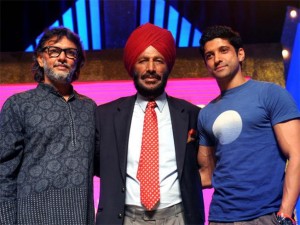 Has Milkha Singh seen the final film and what did he say?
Has Milkha Singh seen the final film and what did he say?
Yes, he has seen it. Once the final cut was ready, the first person I wanted to show the film to in the world was Milkha Singh. We booked a theater in Delhi and we played the film for him. He just went down the memory lane. There was so many things. To see his childhood, to relive the past, to relive a painful past. So many times he was crying. At times he was laughing like a kid. I was sitting next to him and he held my hand. And then that was it; we didn’t have to say anything. He just called me Rakeysh beta. He said, ‘Rakeysh Beta, tumne Milkha Singh ko amar kar diya’. You have immortalized him. He talks about Milkha Singh in the third person. That is really cool!
What do you hope audiences will see and take away with them when they see this film?
I hope they find the Milkha Singh in them. I hope a housewife finds a Milkha Singh, schoolteachers, everyone, I hope they all discover the idea of Milkha Singh in them. For me, it was never the person it was a concept. It was a feeling. I hope they find that. We have given it our best. I have given it the last five years of my life and hopefully I have done justice. That is all you can hope for.
See I told you it was amazing didn’t I? I hope you enjoyed reading it as much as I enjoyed conducting, listening, and writing this interview. Thank you Mr. Mehra!
See their ode to Milkha Singh, when Bhaag Milkha Bhaag hits theaters on July 12th. I know I will be there first show!

